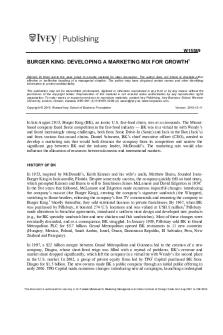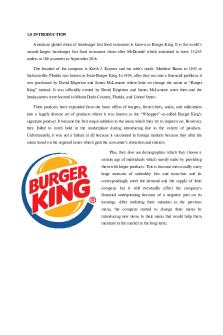Flivver King PDF

| Title | Flivver King |
|---|---|
| Author | Frank Majanga |
| Course | Labour Economics |
| Institution | Kenyatta University |
| Pages | 5 |
| File Size | 83.9 KB |
| File Type | |
| Total Downloads | 33 |
| Total Views | 139 |
Summary
Sinclair's Flivver King...
Description
Surname 1 Student’s name Professor’s name Course Date The Flivver King Introduction Sinclair starts his novel on the ground, letting us see the young Henry Ford trying to be innovative. The young boy is working on what would be his first automobile. Sinclair is very hopeful and sees a very bright future for Henry upon his progression. Ford is a down to earth young man, hardworking, friendly, and an approachable person. Spending most of his time on his invention testing the combustion engine, Ford would educate the neighboring kids on the machine’s principles. Later on, Ford perfects his works and starts the mass production of his invention for sale. He produces cars and sells them cheaply to the consumers, which makes people skeptical about his move. However, to the surprise of many, ford succeeds. Gradually, Ford Company grows into an empire that involves more than 53 industries, becoming a billionaire. Along the way of his success, Ford starts becoming a hard-headed and stubborn. He starts to regard his workers as mere human capital and not human beings anymore. He subjects them to an exhaustible and dehumanizing working atmosphere that deprives them of their rights as human beings. At this point, the vision of Ford, which was to see the company grow into a reputable human-friendly zone, collapsed. Sinclair’s vision of Ford sways. As the book continues, he demonstrates his dissatisfaction through the problems the firm faces with the union, ideological criticism, promotion of anti-Semitism, and the linkages of ford with Hitler and the Nazis.
Surname 2 The ford company enters into trouble with the union of workers who are against the rules and regulations of the company. The struggle for the workers to join the union jeopardized the success of Ford since the industrial unions of workers in the industry was spreading very fast across the country to address the needs of the workers. The United Automobile Workers of America sentiments that “all that had to be furnished was the tactics and the policies”[ CITATION Sin37 \l 1033 ] put Ford Company at stake with the union[CITATION Sin37 \p 210 \n \y \t \l 1033 ]. The union had diverged its members across the different parts of the city to foster workers’ struggle. One man, tom shut, was among the organizers. Being an exford worker and an anti ford, he would go into the ford company and interact with workers at their homes or any place he could meet them to elaborate their rights as workers. This situation hampered fords activities since once in a while, strikes would be organized by the workers. The case ended with henry ordering Tom’s capture, and Sinclair further paints a bad image of him. Henry claimed that workers’ movement was purely a communist affair and fully funded the move and did not want to see capitalists like him succeed[CITATION Sin37 \p 215 \l 1033 ]. Sinclair’s words “when henry resigned he dropped the attempt to decide how his employees should spend their money”[ CITATION Sin37 \l 1033 ] was a direct mockery and criticism of fords ideas[CITATION Sin37 \p 100 \n \y \t \l 1033 ]. Through his utterances, henry was a dictator who would plan on how his employees would use their money. In most cases, Ford would say that he would make cars and pay his workers a lot of money, in which they would still come back and buy his cars, returning the money to him. Through such statements, the unkind personality of ford is brought to light and criticized. Furthermore, henry promised President Wilson that he would return the profits he earned from the war in Germany. Contrary, he did not honor his promise, but since he liked glory so much, he went ahead to make
Surname 3 it public that he returned the money. The secretary of the treasury later confirms that nothing even a penny was received. Henry did not like having idealists around him. He claimed to be tired of them since they would remind him of what he should do in his business. Through Dean Marquis, we see that henry pretended not to know the injustices that his workers underwent. It is a pure lie worth Sinclair’s criticism since he knew all that the workers went through[CITATION Sin37 \p 100 \l 1033 ]. Ford refused to trade with the British, implying that he was not ready to enter into war. “If people were determined to fight, it was their own affair”, was the much the leader of the Ford company could say and would do it proudly without fear of intimidation and “his company would do no war work, and would sell nothing to any belligerent”[CITATION Sin37 \p 61 \l 1033 ]. Despite the measures of trade envisioned by the ford company, henry denounced to follow them. His actions of chartering a ship were met with resistance since by the British government, making historians question henry and his “ship of fools”[ CITATION Sin37 \l 1033 ] did have any sense compared to all the chancelleries of Europe and the British empire[CITATION Sin37 \p 73 \n \y \t \l 1033 ]. Upton likens henrys character to Hitler and the Nazi army when his inner self is advising him. “The way of salvation is clear, but you have to act quickly, put these rats down before their power grows too great. Learn from us; let us do the job!”[CITATION Sin37 \p 216 \l 1033 ]. Sinclair emphasizes that the behavior of ford is to have what relates to Hitler. The names of Ford and Hitler appear in the advertisement of the printed anti-Jewish pamphlets translated in German[CITATION Sin37 \p 216 \l 1033 ]. It is not coincidental that a grandson of an ex Kaiser was offered a job at the ford company, becoming an agent in whom three hundred thousand dollars streamed to the Nazi party treasury. In payback to the growing links between ford and Hitler, many fords factories are set up in Germany. The German-America bund was spearheaded
Surname 4 by Hitler’s right-man, Fritz Kuhn, who moved his headquarters to Detroit, where he was made one of Henry’s chemists. Many Nazis eventually flow into Ford Company, sharing the character, which made him rich, and the ideology of getting what they wanted being cemented in fords mind. Sinclair showed how he was against Ford’s way of operation by highlighting his antiSemitism personality. When Henry meets with Boris Brasol, a Russian investigator of the wicked forces, they blame the Jews and the financial institutions for the thwarting of the capitalists’ progress. “Just look, Mr. Ford! The bakers have been trying to take your business away from you. Who are they? Jews! All international bankers are Jews!”[CITATION Sin37 \p 108 \l 1033 ]. In the Dearborn Independent, Ford started publishing a series of articles on international Jew, condemning them to destroy the gentile’s civilization. He blames the Jews for all the troubles like the epidemics the world is facing. Ford further shows how the Jews control the stage and screen, leading to the deprivation of the morals and breaking the American civilization. Conclusion Sinclair’s dissatisfaction in Henrys’ Ford Company is evident. He is disgusted by the company’s treatment of workers and emphasizes the unionization of the workers, which was against fords principles. He criticizes his ideas since they are meant to oppress the workers who make him a billionaire. He further criticizes the company’s handling of the trade with the British government, since it did not rely on the policies of trade that was envisioned by the company. Sinclair goes ahead to liken henrys behavior with that of Hitler and the Nazi army and significantly exposes the company’s dealing with the Germans. Ultimately, he reveals the antiSemitism character of henry when he highlights how henry was against the Jewish community, blaming them for his company’s troubles.
Surname 5
Works Cited Sinclair, Upton. The flivver king: A story of Ford-America. Selbstverl, 1937....
Similar Free PDFs

Flivver King
- 5 Pages

King Corn
- 2 Pages

Strategies Marketing Burger King
- 6 Pages

Sunjata Vs Lion King
- 3 Pages

Martin Luther King presentation
- 6 Pages

Burger King (Mini Case)
- 4 Pages

Martin Luther King
- 2 Pages

Anexo:Personajes de Shaman King
- 17 Pages

IT - RIASSUNTO STEPHEN KING
- 5 Pages

King Leopold Ghost Essay
- 4 Pages

Despentes teoria king kong
- 62 Pages

Burger King Case Study
- 12 Pages

Stephen King Orasul Bantuit
- 604 Pages

Sophocles\'s Oedipus the King
- 2 Pages
Popular Institutions
- Tinajero National High School - Annex
- Politeknik Caltex Riau
- Yokohama City University
- SGT University
- University of Al-Qadisiyah
- Divine Word College of Vigan
- Techniek College Rotterdam
- Universidade de Santiago
- Universiti Teknologi MARA Cawangan Johor Kampus Pasir Gudang
- Poltekkes Kemenkes Yogyakarta
- Baguio City National High School
- Colegio san marcos
- preparatoria uno
- Centro de Bachillerato Tecnológico Industrial y de Servicios No. 107
- Dalian Maritime University
- Quang Trung Secondary School
- Colegio Tecnológico en Informática
- Corporación Regional de Educación Superior
- Grupo CEDVA
- Dar Al Uloom University
- Centro de Estudios Preuniversitarios de la Universidad Nacional de Ingeniería
- 上智大学
- Aakash International School, Nuna Majara
- San Felipe Neri Catholic School
- Kang Chiao International School - New Taipei City
- Misamis Occidental National High School
- Institución Educativa Escuela Normal Juan Ladrilleros
- Kolehiyo ng Pantukan
- Batanes State College
- Instituto Continental
- Sekolah Menengah Kejuruan Kesehatan Kaltara (Tarakan)
- Colegio de La Inmaculada Concepcion - Cebu

